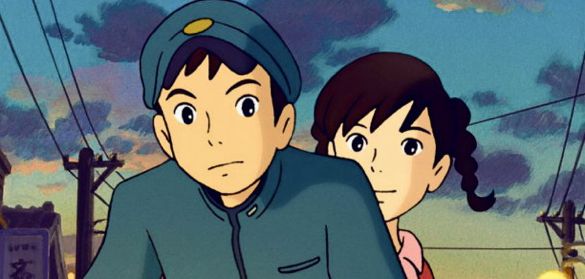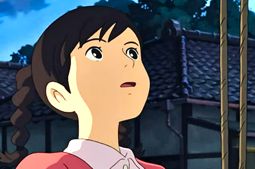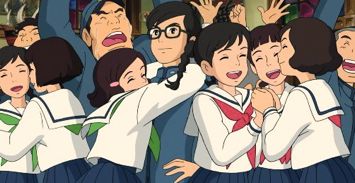
“It’s like some cheap melodrama,” the teen says to the girl he loves, who may or may not be his long-lost sister.
It’s teen melodrama all right, but hardly cheap. “From Up On Poppy Hill” is another handsome and touching film from Japan’s Studio Ghibli, factory of animated masterpieces.
 Hayao Miyazaki, the director of “Princess Mononoke,” “Spirited Away” and several dozen other fantasy films, came up with the concept and adapted the story. Surprisingly, there are no talking animals or wizards on hand to offer advice to its star-crossed teen lovers.
Hayao Miyazaki, the director of “Princess Mononoke,” “Spirited Away” and several dozen other fantasy films, came up with the concept and adapted the story. Surprisingly, there are no talking animals or wizards on hand to offer advice to its star-crossed teen lovers.
“I believe that fantasy has been overdone and has become a game,” the 72-year-old master says. “There are too many (fantasy films).”
Miyazaki is out of the game in any case, having announced his retirement upon completion of this summer’s “The Wind Rises.”
His successor, apparently, is his son, Gorō Miyazaki, who directed this satisfying tale of high school students in the port city of Yokohama in 1963.
In the new Blu-ray’s extra features, Hayao Miyazaki himself gives the film a mixed review, telling Studio Ghibli staffers it’s an “immature work” with both ups and downs.
“From Up On Poppy Hill” should please most fans of Hayao Miyazaki’s work, however, offering mystery, romance, comedy and nostalgia. More than most Ghibli creations, it feels like a local film, rich in specifics about the Japanese port city and post-war life.
“It is truly a movie dedicated to real people,” Miyazaki told the press. The characters’ quandary is best understood by mature audiences — the magnetism of young love vs. the most forbidden of fruits. The brother-sister plot point “must be handled with a great deal of care and caution,” Miyazaki’s story proposal warned his fellow filmmakers.
There are other reminders this project is something different from Ghibli: In one scene, young men have a chat while taking a leak. In another, a young woman breast-feeds a stranger’s newborn. (No worries, the film is fine for youngsters.)
The story centers on a young heroine, of course: hardworking Umi, who runs a small boarding house in her mother’s absence. Each morning she remembers her father, a naval man killed in the Korean War, by raising signal flags that say something like: “I pray for safe voyages.”
 The second major plot line concerns Umi’s high school, where the boys pursue their academic interests in a ramshackle old mansion. “All that dust is a part of history,” one says of the “club house.” The old building reflects Studio Ghibli’s love of charming & complicated edifices.
The second major plot line concerns Umi’s high school, where the boys pursue their academic interests in a ramshackle old mansion. “All that dust is a part of history,” one says of the “club house.” The old building reflects Studio Ghibli’s love of charming & complicated edifices.
Japan’s modernization push means the dirty old mansion must be torn down. Among those trying to save it is student Shun, who demonstrates his preservationist zeal by making a multistory leap from the building into a pool of dirty water.
After the stunt, Umi and Shun meet cute, drawn by a mysteriously strong attraction. But they soon discover they have identical photos of their late fathers, who are pictured with two other uniformed naval men.
Shun breaks the news to Umi that they appear to be brother and sister, separated as infants, and that they must suppress their romantic feelings for each other. Easier said then done. What might seem a farfetched plot line feels real enough set against the domestic chaos created by two wars and a nuclear holocaust.
The story came from a shojo (girls) manga comic that Hayao Miyazaki found left in a cabin by one of his nieces. It took more than 30 years for the project to become reality. The Miyazakis moved the story from the early 1980s (“too recent”) to 1963, the year Japan prepared for its Olympics.
The Blu-ray’s extra features — put together by Studio Ghibli — offer unexpected drama in the story of “Poppy Hill’s” production. Ghibli was about halfway through the film when the earthquake/tsunami disasters of 2011 hit.
Video of a promotional press conference (ostensibly about the theme song) shows the Miyazakis and some collaborators still in shock but functioning weeks after the natural disasters. They explain that they considered shelving the film, but carried on in kinship with the many heroes helping the island nation recover.
“I hope the movie will provide some emotional support to those who’ve suffered,” says Miyazaki senior, wiping away tears. “I believe we did the right thing.”
The young woman who sings the theme song soon breaks down into tears.
Western audiences may recognize one of the film’s key musical numbers, “Ue o Muite Aruko” (I shall walk looking up), an infectious pop hit in Japan that crossed over to the U.S. in 1963 — retitled, bizarrely, “Sukiyaki” (as in the beef dish).
The “Poppy Hill” Blu-ray (and DVD) comes not from Disney but from Gkids (“The Secret of Kells”) and partner Cinedigm, the indie distributor. The home video’s production values and extras exhibit the same high quality as Disney’s video rereleases of Miyazaki’s classics.
Viewers can choose between subtitled and dubbed versions of the film, but the discs’ default goes to the English-language presentation, produced by heavy-hitters Frank Marshall and Kathleen Kennedy.
Gkids released “Poppy Hill” to cinemas domestically with the English voice artists, who include Jamie Lee Curtis (the traveling mom), Bruce Dern (a ship’s captain), Ron Howard (the noisy drooly philosophy club president) and Beau Bridges (the cool tycoon). Umi is played by Sarah Bolger (“Once Upon a Time”), subbing for the original actress, Masami Nagasawa. A 20-minute short film on the Blu-ray documents the U.S. sessions and is worth a look, even if you choose to watch the movie subtitled.
Other Blu-ray features include the complete storyboards; an interview with soft-spoken Gorō Miyazaki that focuses on his research on the Yokohama of the 1960s; and an upbeat but wordless now-and-then piece on the port city.
The Blu-ray comes packaged with a separate DVD disc whose only special feature is the storyboarding. This combo pack features a booklet with parts of the original treatment and a curious note from the director. There also is a separate DVD edition.
Glenn Abel on Google+



Leave a Reply